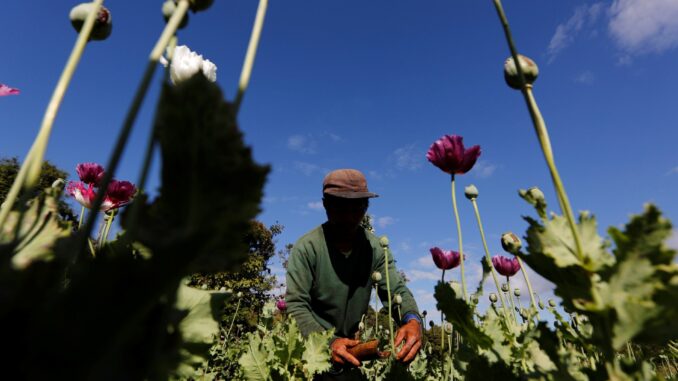
Myanmar has become the world’s top producer of opium, overtaking Afghanistan in 2023, according to a new United Nations report.
The 95 percent decline in opium cultivation in Afghanistan after a drug ban by the Taliban in 2022 has seen global supply shift to Myanmar, where political, social and economic instability brought about by a 2021 coup drove many to poppy farming, the UN Office on Drugs and Crime (UNODC) said on Tuesday.
list of 3 items
list 1 of 3
Opium cultivation surges since Myanmar military seized power: UN
list 2 of 3
Q&A: The opium surge in Southeast Asia’s ‘Golden Triangle’
list 3 of 3
Afghan opium poppy cultivation plunges by 95 percent under Taliban: UN
end of list
Myanmar farmers now earn about 75 percent more from opium poppy farming, as average prices of the flower have reached about $355 per kilogramme, the report (PDF) said.
From 2022 to 2023, Myanmar saw the estimated amount of land used to grow the illicit crop increase by 18 percent, from 40,100 to 47,000 hectares (99,000 to 116,000 acres).
“Although the area under cultivation has not returned to historic peaks of nearly 58,000 ha (143,000 acres) cultivated in 2013, after three consecutive years of increases, poppy cultivation in Myanmar is expanding and becoming more productive,” the report said.
Opium cultivation areas expanded most in Myanmar’s border regions in northern Shan state, followed by Chin and Kachin states, as yield expanded by 16 percent to 22.9 kilogrammes per hectare because of more sophisticated farming practices, it added.
The violent political turmoil in Myanmar has contributed to the opium production increase.
UNODC Regional Representative Jeremy Douglas said the “economic, security and governance disruptions that followed the military takeover of February 2021 continue to drive farmers in remote areas towards opium to make a living”.
He said that armed conflict in Shan state, a traditional growing region, and other border areas “is expected to accelerate this trend”.
The report noted that “opium poppy cultivation in Southeast Asia is closely linked to poverty, lack of government services, challenging macroeconomic environments, instability, and insecurity”.
Northeastern Myanmar is part of the infamous “Golden Triangle”, where the borders of Myanmar, Laos and Thailand meet. The production of opium and heroin historically flourished there, largely because of the lawlessness.
In recent decades, as the region’s opium production dropped, methamphetamine in the form of tablets and crystal meth has supplanted it.
UNODC said in a statement accompanying its report that the region’s burgeoning drug production “feeds into a growing illicit economy … which brings together continued high levels of synthetic drug production and a convergence of drug trafficking, money laundering and online criminal activities including casinos and scam operations”.
Afghanistan, the world’s biggest opium producer for some years, has seen cultivation collapse after the Taliban – which retook power in 2021 – promised to end illegal drug production.
Poppy crops accounted for almost a third of the country’s total agricultural production by value last year, but the area used for poppies shrank from 233,000 hectares in late 2022 to 10,800 in 2023.
Violent political turmoil in Myanmar in years since 2021 coup has contributed to production increase, new report says.
ENB Top News
ENB
Energy Dashboard
ENB Podcast
ENB Substack



